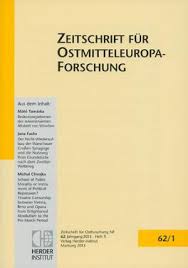Die Umsiedlung in deutschbaltischen Autobiographien
The resettlement in German-Baltic autobiographies
Author(s): Maris SaagpakkSubject(s): Cultural history, Social history, Identity of Collectives
Published by: Verlag Herder-Institut
Keywords: resettlement; German-Baltic autobiographies;
Summary/Abstract: Autobiographic texts show how the writer remembers certain events of the past and which emotions he attaches to them. Not only, but particularly for the German-Baltics, was the resettlement a decisive event in Baltic history. Looking at autobiographic texts, the present article examines how German-Baltic authors depicted the resettlement right after it happened and from a greater distance of time. The text corpus analyzed includes published and well-known autobiographies as well as unprinted writings. It can be concluded that the resettlement marked a dramatic turning-point, both from the perspective of individual authors and from a collective point of view. There is no autobiography of a German-Baltic contemporary in which the resettlement is not mentioned. In presenting this event, writers developed common patterns of description and Interpretation. Many authors narrate in great detail where, how and through whom they received the news of the resettlement and what they were feeling at that moment. The reader senses that the authors wish to make their experience and suffering comprehensible and explainable. In many memories we read that, even before the resettlement, there was no future for the German-Baltics in their home country. Some authors report with delight that the existence of the German-Baltics was at last noticed in Hitler's Germany and that the Germans abroad were now taken care of. The description of the departure on steamers, which symbolizes the final break with their old life, also appears in numerous texts. The feeling that there was no way back made the trauma of losing their home an integral part of their identity.
Journal: Zeitschrift für Ostmitteleuropa-Forschung
- Issue Year: 56/2007
- Issue No: 1
- Page Range: 50-67
- Page Count: 18
- Language: German

